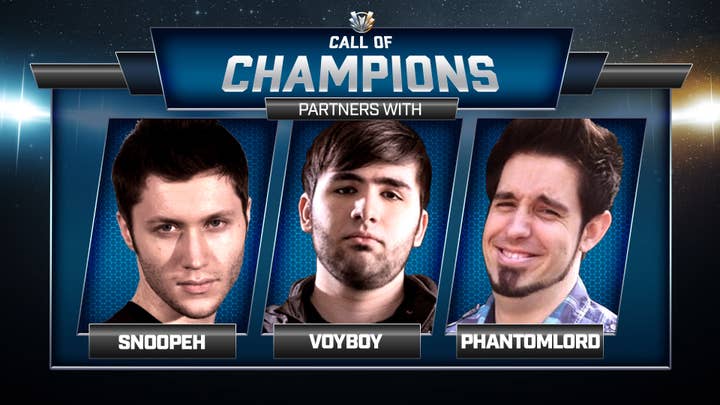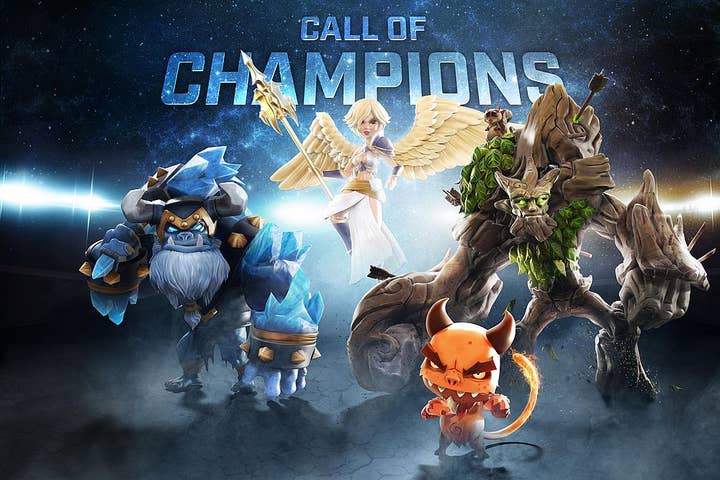Will eSports thrive on mobile?
Spacetime Studios enrolls expert help to create "the future of competitive gaming" on mobile
The fast-growing eSports market has become a major force behind the success of companies like Riot Games, which is notching up well over $1 billion in revenue on an annual basis from its single game League of Legends. Other games like DotA 2 from Valve and World of Tanks from Wargaming are also generating big sales because of the popularity of professional competitive gaming. This sort of success doesn't go unnoticed, and of course it's natural to think this sort of competitive gaming could become important on mobile platforms as well - hence games like Vainglory from Super Evil Megacorp.
The latest entrant to throw its hat into the competitive gaming ring is Spacetime Studios, a Texas-based independent mobile game developer and publisher best known for its mobile MMO Pocket Legends. The studio was founded by videogame veterans Cinco Barnes, Gary Gattis, Jake Rodgers and Anthony L. Sommers. Now the company is preparing a mobile multiplayer online battle arena (MOBA) game, Call of Champions, and they've enlisted the help of three professional gamers to sharpen the game's competitive edge: James "PhantomL0rd" Varga, Joedat "Voyboy" Esfahani and Stephen "Snoopeh" Ellis.
"Spacetime was formed back in 2005 to build a very large MMO for NCsoft," CEO Gary Gattis recalled. "It was a very large-scale product - $25 million - and we invested maybe $15 million in the tech. The game was canceled in 2008 but we got to keep the technology. So we've got very, very powerful client-server, enterprise-class technology. We didn't really know what to do with it."
"Our tech is fairly unique in that it lets us have global synchronous PVP on iOS and Android, so everyone around the world plays on the same server set, even through very high-latency connections, all the way down to EDGE"
Gary Gattis
As they pondered, the growth of eSports and MOBAs caught their eye. "We've been watching the rise of competitive gaming on PC for several years. We thought that was something we wanted to take on, so our latest game Call of Champions is an expression of that," Gattis said.
The design of a competitive mobile game is, by necessity, a very different beast than a console or PC game. "We were inspired by our love of the MOBA, but we had to change to fit the lifestyle and screentime that we enjoy on our mobile devices," said Cinco Barnes, chief vision officer for Spacetime Studios. "That led to a lot of things that define Call of Champions as its own product. We've got some neat mechanics there we think are really fresh. We've got a lot of depth that takes place in a really short time. We're enforcing a time period on the game so that we can get the most out of positioning, tactics, and skill shots."
Putting in the effort with the technology and the design led Spacetime to bring in some expert assistance in the field of competitive gaming. "We're reaching out to the cream of the crop in competitive gaming to consult and push this all the way through to make this the game of our dreams, ultimately," said Barnes.
Gattis added, "Our tech is fairly unique in that it lets us have global synchronous PVP on iOS and Android, so everyone around the world plays on the same server set, even through very high-latency connections, all the way down to EDGE. When we started looking for consultants we talked to a whole bunch of guys. We think we are the future of competitive gaming, and the guys we're talking to are also very interested in the future of competitive gaming. That's really how we linked up with these three dudes."

Those dudes have a lot of experience with professional gaming and streaming. James "PhantomL0rd" Varga started his career in eSports in September 2011 and eventually hit number one on the North American ladder for League of Legends. "I saw other people showcasing their play to viewers; I decided I wanted to do it for myself," Varga noted. He formed a pro team called V8, but ended up only doing that for a few months before deciding it was not for him. "I settled back on streaming and entertaining my fan base," Varga said.
Joedat "Voyboy" Esfahani was a pro gamer who started playing during high school in 2010, back when League of Legends was still pretty small. "I had to decide whether I was going to university or pursue eSports," Esfahani said. "I went with eSports and played for four years straight." Since last November he's taken a step back and has been streaming full-time on Twitch.
Stephen "Snoopeh" Ellis spent four years as a pro gamer playing League of Legends, and remembers his early days of being coached by SK Gaming and the culture shock of going to China, as well as the surprise of realizing that people played games professionally. "I've been watching eSports grow tremendously," said Ellis. Now he doesn't get that much time to play because of his travel schedule, which is part of why he's excited by Call of Champions - Ellis figures he'll have a lot more opportunities to play a competitive mobile game that can be done in short sessions.
There are lots of issues with bringing the depth of competitive PC games to mobile, and there were plenty of challenges for Spacetime. "You hit it on the head with depth as the number one thing the design team has to adapt," said Barnes. "Being inspired by the MOBA means we need to understand those core mechanics and what makes us love them so much. What we do in Call of Champions is extract and adapt those things that are appropriate for a mobile gaming device. For instance, having the depth in positioning and use of skill shots is really comfortable in a touch-screen environment, but having a match that lasts longer than five minutes doesn't really fit overall. Our duty is to adapt those things that are the most appropriate and the most fun, and we love having that core gameplay and the ability to move a champion and win by positioning and great timing."
"We can help with balance, give our feedback on the things that we think are really cool and what can be tuned to be more reflective of a competitive game"
Joedat "Voyboy" Esfahani
The pro gamers are looking forward to contributing to game design. "We've all been playing for years, and we've gained a really good perspective on what makes MOBAs successful from a competitive standpoint," said Esfahani. "We can help with balance, give our feedback on the things that we think are really cool and what can be tuned to be more reflective of a competitive game. That's something we're all really excited to get the chance to work on."
The game is entering a closed alpha soon, where Spacetime is looking to bring in highly experienced gamers to help refine the gameplay, but its official release date is still up in the air. "I want it to come out this year," Barnes said. "One of the advantages we have at Spacetime is we're really going to use this exclusive alpha period and then opening up to our later beta period to get the game right. What I want for my dream game is that it's going to be good. I hope for it to come out this year, but ultimately it's going to be out when the game is really awesome."
That's certainly the best time to ship a game, but sadly that's not always the case in this business. Spacetime looks to be putting in the level of effort and expertise necessary to create a great game and giving it the time to develop properly, but until a game meets players on a broad level you can't really tell the level of success that will be achieved. Call of Champions will be available for iOS and Android devices.

